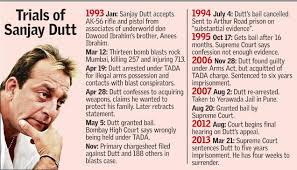[highlight]-Mansi Jain, Vivekananda Institute of Professional Studies.[/highlight]
On March 12, 1993, Mumbai was devastated by 12 bomb blasts between 1:33 pm to 3:40 pm that left around 257 people dead and injured another 700. Property worth Rs.30 crore was damaged in the blasts. The blasts severely rocked Bombay Stock Exchange building, Air-India Building at Nariman Point, Worli opposite Century Bazaar, Hotels Sea Rock and Juhu Centaur among other pivotal city points.
On April 19, 1993, Police arrested Sanjay Dutt upon his arrival from Mauritius, on the ground that an AK-56 rifle was found in his house which was from the consignment of arms smuggled into India before the blasts. He was arrested for illegal possession of firearms acquired from terrorist acquaintances who were responsible for the blasts.
On April 26, 1993, he admitted to the charges in his confession. But later retracted the confession. A TADA court had later sentenced 20 people to life imprisonment and 46 others, including Sanjay Dutt were given varying terms of imprisonment.
On May 3, 1993, he was released on bail by the Bombay High Court. On July 4, 1994, Trial court canceled his bail and he was arrested again. On October 16, 1995, after spending nearly 16 months in jail, he again got bail on hearing a letter written by him to the Chief Justice from jail. The letter was converted into a petition.
On November 28, 2006, TADA court in Mumbai acquitted him of charges of conspiracy in the 1993 serial blasts framed under TADA Act but convicted him of the lesser crime of possessing arms. On March 21, 2013, Sanjay Dutt’s conviction was upheld, and six year jail term was reduced to 5.
There has been a heated debate about his conviction. The pro-sanjay dutt brigade’s logic is clear: he made a mistake,he is innocent and comes from a good family. The powerful political and societal lobby is sympathizing with him and arguing that the sentence is too harsh.
[quote]The credibility of law depends not upon equal treatment, but upon treatment as equals. Reasoning which are being given to pardon Sanjay Dutt do not seem sound. But the question remains why this sudden cry of mercy for him?[/quote]
Press Council of India Chairman, Justice Markandey Katju sent a written appeal to the President of India seeking pardon for Sanjay Dutt. The problem with Justice Katju’s appeal is that it was basically an emotional plea. Coming from him, a former judge of the Supreme Court, it is expected that beyond sentiments, the appeal should had also been legally sound.
[highlight]No one is above law. The Supreme Court found him guilty and therefore, his sentence is justified. Sanjay Dutt is actually a very lucky man. He escaped the stigma of being punished under a terror law and the TADA Court Judge even said he was not a terrorist.[/highlight]



1 Comment
Sanjay Dutt isn’t as lucky as you profess, I was in the Courtroom while the judgement was pronounced, and had the Bench the power to commute his sentence it would have been done. It was only that the Hon’ble Supreme Court could not lower his sentence any further that he has to undergo a prison sentence.